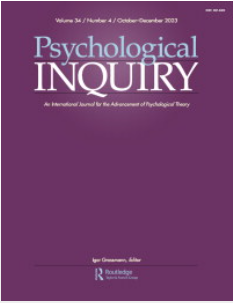心理免疫系统:什么需要保护?
IF 7.2
2区 心理学
Q1 PSYCHOLOGY, MULTIDISCIPLINARY
引用次数: 0
摘要
自我理论是由多个学科的无数学者的工作建立起来的。它吸收了来自不同研究领域的意见。心理学家的观点受到许多其他领域的启发和启发。Sedikides(本期)通过借鉴免疫学的见解和模型,扩展了这一丰富的综合传统。他的许多发人深省的分析为心理现象提供了潜在的见解,事实上,其中一些影响超出了构建心理理论的任务,延伸到理解整个社会的问题。作为一个让我们印象深刻的例子,他将生物接种与心理防御的发展相比较,为现代大学作为一个整体面临的一个备受讨论的问题提供了一个新的、强有力的见解。许多学者注意到,在过去的五年里,大学生变得越来越脆弱。前几代学生要求被允许听到激进、具有挑战性的想法,而现代学生则要求被屏蔽。(Lukianoff和Haidt【2018】对这一彻底的变化进行了尖锐的分析。)现代学生经常声称,一些想法威胁到他们的生存权——甚至,著名的是,报纸上的一篇专栏文章只不过记录了大学管理者在政治上比教职员工更左倾(Abrams 2018;见Morabito 2019;Paresky 2019)。一些学生要求提前发出触发警告,提醒他们讲座或阅读可能会提到会打扰他们的话题或理论(尽管不断积累的证据表明,触发警告并不能减少焦虑,实际上可能会增加焦虑;见Bellet等人2020)。这种普遍存在的学生不适和脆弱(被批评者嘲笑为“雪花”心态)可以用Sedikides的话理解为接种失败。正如Lukianoff和Haidt(2018)所记录的那样,所有人都认为,美国父母在20世纪90年代开始过度保护孩子。心理学家对这种转变负有一定责任,因为那个时代痴迷于自尊表面上的重要性和脆弱性(例如,1990年加州促进自尊和个人及社会责任工作队)。正如科学工作的典型情况一样,随着信息通过大众媒体传播给公众,实际科学研究的复杂性、争论和局限性都消失了。结果是,父母变得不愿意批评孩子,并试图保护他们免受失败、挑战甚至令人不安的想法的影响。这与前几代人强调的育儿方式形成了鲜明对比,他们首先希望避免孩子被宠坏或骄傲。21世纪的父母成功地保护了孩子免受任何负面影响,他们培养出了缺乏心理免疫系统的年轻人,他们有能力应对自己的自我观或世界观受到的威胁。事实上,Sedikides对疫苗接种不足的分析有可能被用来说服新父母放弃过度保护的方式,恢复更平衡的育儿方式。儿童需要遇到一些问题和失败,并学会自己应对这些问题和失败的信息,这可能会造福子孙后代。本文章由计算机程序翻译,如有差异,请以英文原文为准。
The Psychological Immune System: What Needs Defending?
The theory of the self has been built up by work of countless scholars across multiple disciplines. It has taken input from very different fields of study. Psychologists’ views have been edified and informed by many other fields. Sedikides (this issue) extends this rich, integrative tradition by borrowing insights and models from immunology. Many of his thought-provoking analyses offer potential insights into psychological phenomena, indeed some of whose implications extend beyond the task of building psychological theory to understanding society-wide problems. As a particular example that struck us, his parallel between biological inoculation and the development of psychological defenses offers a fresh and powerful insight into a much-discussed problem facing modern universities as a whole. Many scholars have noted that in the past five years college students have become increasingly fragile. Whereas earlier generations of students demanded to be allowed to hear radical, challenging ideas, modern students demand to be shielded from them. (Lukianoff and Haidt [2018] have offered a trenchant analysis of this sweeping change.) Modern students often claim that some ideas threaten their right to exist—even, famously, a newspaper op-ed that did no more than document that university administrators are more politically left-leaning than the faculty (Abrams 2018; see Morabito 2019; Paresky 2019). Some students demand trigger warnings to alert them in advance that a lecture or reading might mention topics or theories that would disturb them (even though accumulating evidence indicates that trigger warnings do not reduce anxiety and indeed may increase it; see Bellet et al. 2020). This widespread student malaise and fragility (derided as “snowflake” mentality by critics) can be usefully understood in Sedikides’s terms as a failure of inoculation. By all accounts, American parents shifted in the 1990s to become hyper-protective of their children, as documented by Lukianoff and Haidt (2018). Psychologists bear some responsibility for this shift, as that era was obsessed with the ostensible importance and fragility of self-esteem (e.g., California Task Force to Promote Self-Esteem and Personal and Social Responsibility 1990). As is typical with scientific work, the complexities, debates, and limitations of the actual scientific research got lost as the message was transmitted via the mass media to the general public. The result was that parents became reluctant to criticize their children and sought to protect them from failure, challenge, or even unsettling ideas. This contrasted sharply with the style of child-rearing emphasized in earlier generations, which wanted above all to avoid a spoiled or prideful child. Insofar as 21-century parents succeeded at sheltering their children from anything negative, they produced young adults who lack the psychological immune system with the power to cope with having their self-views or worldviews threatened. Indeed, it is possible that Sedikides’s analysis of deficient inoculation could be used to persuade new parents to abandon the overprotective style and resume a more balanced approach to child-raising. The message that children need to encounter some problems and failures, and to learn to cope with them themselves, might potentially benefit future generations.
求助全文
通过发布文献求助,成功后即可免费获取论文全文。
去求助
来源期刊

Psychological Inquiry
PSYCHOLOGY, MULTIDISCIPLINARY-
CiteScore
10.30
自引率
1.10%
发文量
31
期刊介绍:
Psychological Inquiry serves as an international journal dedicated to the advancement of psychological theory. Each edition features an extensive target article exploring a controversial or provocative topic, accompanied by peer commentaries and a response from the target author(s). Proposals for target articles must be submitted using the Target Article Proposal Form, and only approved proposals undergo peer review by at least three reviewers. Authors are invited to submit their full articles after the proposal has received approval from the Editor.
 求助内容:
求助内容: 应助结果提醒方式:
应助结果提醒方式:


